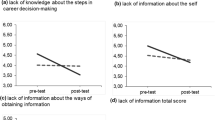Abstract
This paper examines several conceptual frameworks that can inform elementary career intervention programming. Equity, social justice, and the development of intrinsic motivation are key concepts in the promotion of social action initiatives aimed at improving academic achievement and expanding future career options for all students. Early career interventions provide the ideal venue for prevention efforts in elementary schools. Relevant career theory forms the basis for the design and delivery of elementary career intervention programming.
Similar content being viewed by others
References
A.V. Beale (2000) ArticleTitleElementary school career awareness: A visit to a hospital Journal of Career Development 27 65–73
A. V. Beale (2003) ArticleTitleIt takes a team to run a restaurant: Introducing elementary students to the interrelatedness of occupations Journal of Career Development 29 211–220
D. Blustein S. Phillips K. Jobin-Davis S. Finkelberg A. Roake (1997) ArticleTitleA theory building investigation of the school-to-work transition The Counseling Psychologist 25 364–402
A. D. Brathwaite (2002) ArticleTitleA way with words: A unique approach to literacy and career development Journal of Career Development 28 221–225
C. A. Campbell C. A. Dahir (1997) The national standards for school counseling programs. American School Counselor Association Alexandria, VA
E. Deci R. Ryan (1985) Intrinsic motivation and self-determination in human behavior Plenum New York
E. Deci R. Ryan (1987) ArticleTitleThe support of autonomy and the control of behavior Journal of Personality and Social Psychology 53 1024–1037
E. Deci R. Ryan (1991) A motivational approach to self: Integration in personality R. Dienstbier (Eds) Nebraska symposium on motivation: Vol. 38. Perspectives on motivation University of Nebraska Press Lincoln 237–288
E. Deci R. Ryan (1995) Human autonomy: The basis for true self-esteem M. Kernis (Eds) Efficacy, agency, and self-esteem Plenum New York 31–49
E. Deci R. Ryan (2002) The paradox of achievement: The harder you push, the worse it gets J. Aronson (Eds) Improving academic achievement: Impact of psychological factors on education Academic Press San Diego, CA 62–90
H. N. Drier (2000) ArticleTitleSpecial issue introduction: Career and life planning key feature within comprehensive guidance programs Journal of Career Development 27 73–80
J. H. Evans H. D. Burck (1992) ArticleTitleThe effects of career education interventions on academic achievement: A meta-analysis Journal of Counseling & Development 71 63–68
N. Fouad (1997) ArticleTitleSchool-to-work transition: Voice from an implementer The Counseling Psychologist 25 403–412
E. R. Gerler (1985) ArticleTitleElementary school counseling research and classroom learning environment Elementary School Guidance and Counseling 20 39–48
E. Gordon (1999) Education and justice: A view from the back of the bus Teachers College Press New York
Gottfredson, L. (1981). Circumscription and compromise: A developmental theory of occupational aspirations. Journal of Counseling Psychology, 28, 545–579.
N. C. Gysbers (1997) ArticleTitleInvolving counseling psychology in the school-to-work movement: An Idea whose time has come The Counseling Psychologist 25 413–427
N. C. Gysbers P. Henderson (2000) Developing and managing your school guidance program EditionNumber3 American Counseling Association Alexandria, VA
M. R. Jalongo (1989) ArticleTitleCareer education Childhood Education 66 108–115
L. S. Johnson (2000) ArticleTitleThe relevance of school to career: A study in student awareness Journal of Career Development 26 263–276
R. S. Lee (1993) ArticleTitleEffects of classroom guidance on student achievement Elementary Guidance and Counseling 27 163–171
C. S. Magnuson M. F. Starr (2000) ArticleTitleHow early is too early to begin life career planning The importance of the elementary school years. Journal of Career Development 27 89–101
J. J. McWhirter B. T. McWhirter A. M. McWhirter E. H. McWhirter (1994) ArticleTitleHigh- and low-risk characteristics of youth: The five C’s of competency Elementary School Guidance & Counseling 28 188–196
J. J. McWhirter B. T. McWhirter A. M. McWhirter E. H. McWhirter (1998) At-risk youth: A comprehensive response. Brooks/Cole Publishing Pacific Grove, CA
J. Miller (1977) Career development needs of 9-year-olds: How to improve career development programs. National Advisory Council for Career Education Washington, DC
National Center for Educational Statistics (1999) Dropout rates in the United States, 1999 (Statistical Analysis Report: NCES 2001–022). Author Washington, DC
R. Ryan E. Deci W. Grolnick (1995) Autonomy, relatedness, and the self: Their relation to development and psychopathology D. Cicchetti D. J. Cohen (Eds) Developmental psychopathology: Theory and methods Wiley New York 618–655
V. S. Solberg K. A. Howard D. L. Blustein W. Close (2002) ArticleTitleCareer development in the schools: Connecting School-to-work-to-life The Counseling Psychologist 30 705–725
M. F. Starr (1996) ArticleTitleComprehensive guidance and systematic educational and career planning: Why a K-12 approach Journal of Career Development 23 9–22
D. Super (1953) ArticleTitleA theory of vocational development American Psychologist 8 185–190
D. E. Super (1957) The psychology of careers. Harper & Bros New York, NY
D. Super (1980) ArticleTitleA life-span, life-space, approach to career development Journal of Vocational Behavior 16 282–298
D. E. Super (1990) A life-span, life-space approach to career development D. Brown L Brooks & Associates (Eds) Career choice and development EditionNumber2 Jossey-Bass San Francisco, CA 197–261
D. E. Super M. L. Savickas C. M. Super (1996) The life-span, life-space approach to careers D. Brown L. Brooks & Associates (Eds) Career choice and development EditionNumber3 Jossey-Bass Publishers San Francisco, CA
R. Worthington C. Juntunen (1997) ArticleTitleThe vocational development of non-college-bound youth: Counseling psychology and the school-to-work transition movement The Counseling Psychologist 25 323–363
Author information
Authors and Affiliations
Corresponding author
About this article
Cite this article
Palladino Schultheiss, D.E. Elementary Career Intervention Programs: Social Action Initiatives. J Career Dev 31, 185–194 (2005). https://doi.org/10.1007/s10871-004-2226-1
Issue Date:
DOI: https://doi.org/10.1007/s10871-004-2226-1



